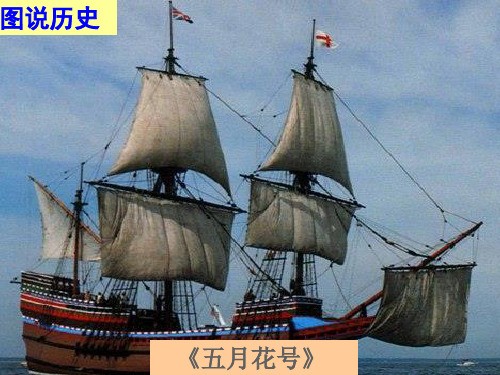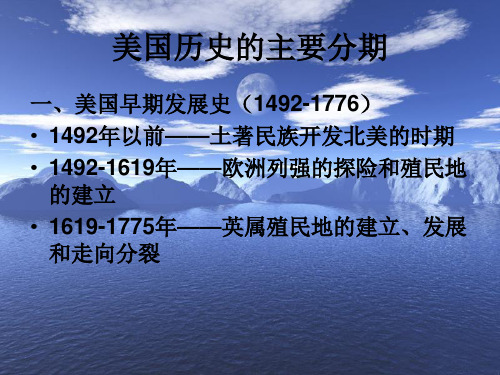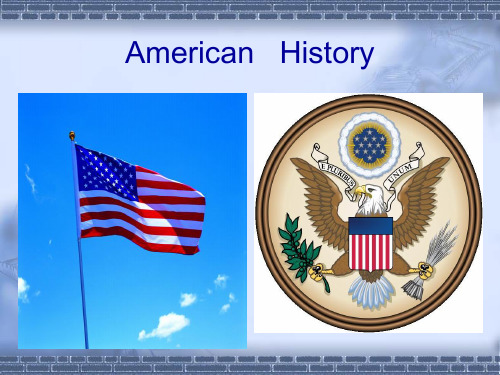美国历史PPT
合集下载
第12课美国的诞生(共46张PPT)

思考:在当时历史条件下,体现了哪些进步性? 1.反映了殖民地人民摆脱民族压迫的强烈要求; 2.体现了平等、自由等主张,注重人权。
英军的实力比美军强大得多
1777年:萨拉托加战役 转折:
1777年,5700名英军投降,从 波士顿被遣返回国 。
1781年10月,约克镇战役英军投降,战争基本结束
1781年,在法军舰队的配合下, 美军在约克镇迫使英军司令康华利 率7000人投降。
独立试航
1.美国独立战争爆发的根本原因是 A. 英国的殖民压迫阻碍了北美资本主义经济的 发展 B. 北美人民的反抗情绪高涨 C. 英国政府在政治上对北美人民采取高压政策 D. 英国在加拿大建立了殖民地 2.每年的7月4日,美国人民都会载歌载舞,欢 庆国庆。下列哪一文件与美国国庆日有直接关 系 A.《权利法案》 B.《人权宣言》 C.《共产党宣言》 D.《独立宣言》
中央收回大权 (握紧的拳头)
构建美国中央政府的权力分配?
国会大厦 总统 总统 最高法院
立法权
参议院 众议院
行政权
内阁 其他机构
司法权
最高法院
分权原则
(行政) 权 “分权与制衡”原则
总统
总统任命法官需经参议院通过
解释宪法权
(立法) 权 国会 权 (司法)
最高法院
1787年宪法局限性:
合众国公民的选举权不得因种族、肤色或以前是奴隶而 被合众国或任何一州加以拒绝或限制。
美利坚民族开始形成
一、英属北美殖民地的发展:
1.北美的土著居民: 2. 属北美殖民地的开发: 各地移民开发北美 3.北美殖民地经济的发展:
孕育
个殖民地
4.美利坚民族的形成:
一、渴望自由——英属北美殖民地的发展
美国概况ppt课件

职业教育与培训
美国有发达的职业和教育机构,提供 各种技能和职业培训,帮助人们实现 职业目标。
艺术与娱乐
电影与音乐
美国电影和音乐产业在全球具有重要地位, 产生了许多世界知名的电影和音乐家。
视觉艺术
美国拥有许多知名的博物馆和艺术机构,展 示了各种类型的艺术品。
文学与戏剧
美国文学和戏剧作品丰富多样,反映了美国 社会的各个方面。
一。
白宫
美国总统的官邸,也是 美国历史上的重要建筑
。
自由女神像
位于纽约市,是美国的 象征之一。
03 美国文化
价值观
个人主义
美国人高度重视个人独立和自 由,尊重个人选择和权利。
功利主义
美国人通常以实用主义为导向 ,重视个人成就和成功。
平等与机会
美国文化强调平等的机会,而 非平等的待遇,鼓励个人通过 努力和才能获得成功。
今。
种族暴力
历史上和现实中,美国都存在针对少 数族裔的种族暴力事件,如仇恨犯罪
等。
种族隔离
历史上,美国存在过严格的种族隔离 制度,限制了非裔美国人等少数族裔 的发展机会。
种族经济不平等
不同种族间在经济机会上存在显著差 异,导致贫困和资源分配不均等问题 。
社会不平等
贫富差距
美国社会中存在显著的贫富差距,富人越来越富,而穷人则陷入贫困 。
行政机构
总统领导的行政机构包括内阁、各 部委和独立机构等。
04
选举制度
总统选举
每四年举行一次,选举产生新一届总统和副总统。
国会选举
每两年举行一次,选举产生新一届国会议员。
州和地方政府选举
各州和地方政府根据自身规定举行选举。
选举人团制度
美国历史ppt课件

Christopher Columbus.
Introduction to British and American Culture
American Indians
• The Bering Strait was tied together
• It was possible to for the Indians to walk from Asia to Alaska 25000 years ago.
• By the early 1760s, English settlers had established 13 colonies along the Atlantic coast.
Introduction to British and American Culture
The Birth of the United States
from? __________________________________ 3. Which American holidays do you know? __________________________________
Introduction to British and American Culture
Jamestown, Virginia.
Introduction to British and American Culture
The Mayflower
• Significance
– A symbol of early European colonization of the Americas
• Background
• Result
– The British soldiers were forced to surrender.
Introduction to British and American Culture
American Indians
• The Bering Strait was tied together
• It was possible to for the Indians to walk from Asia to Alaska 25000 years ago.
• By the early 1760s, English settlers had established 13 colonies along the Atlantic coast.
Introduction to British and American Culture
The Birth of the United States
from? __________________________________ 3. Which American holidays do you know? __________________________________
Introduction to British and American Culture
Jamestown, Virginia.
Introduction to British and American Culture
The Mayflower
• Significance
– A symbol of early European colonization of the Americas
• Background
• Result
– The British soldiers were forced to surrender.
第六节美国的建立PPT课件

You Know, The More Powerful You Will Be
15
谢谢大家
荣幸这一路,与你同行
It'S An Honor To Walk With You All The Way
演讲人:XXXXXX
时 间:XX年XX月XX日
16
9
1776年7月4日,第二届大陆会议通过《独立宣言》
10
FRANKLIN
11
萨拉托加大捷
12
1783年 的美国
13
1787年美国宪法的通过
14
写在最后
经常不断地学习,你就什么都知道。你知道得越多,你就越有力量 Study Constantly, And You Will Know Everything. The More
波 士 顿 倾 茶 事 件
莱
第克
一 届 大
星 顿
陆枪
会 议
声
大陆军
《 独 立 宣 言 》
萨
拉 托 加 大 捷
约 克 镇 战 役
华盛顿
三、美国建立的历史意义
1783
美 英 和 约
1787 1789
《联
宪邦
法 》
政 府
3
重点
北美独立战争爆发、结束及原因 《独立宣言》和1787年宪法
4
基础知 识检测
美国独立战争
1775年4月 来克星顿枪声
标志着 萨拉托加独战立役战争的爆发
1777 转折点
1781年10月, 约克镇战役 英军最后投降。 5
18 世 纪 北 美 : 英 国 和 西 班 牙 殖 民 地
6
1607--1733年 英国在北美
建立13块
15
谢谢大家
荣幸这一路,与你同行
It'S An Honor To Walk With You All The Way
演讲人:XXXXXX
时 间:XX年XX月XX日
16
9
1776年7月4日,第二届大陆会议通过《独立宣言》
10
FRANKLIN
11
萨拉托加大捷
12
1783年 的美国
13
1787年美国宪法的通过
14
写在最后
经常不断地学习,你就什么都知道。你知道得越多,你就越有力量 Study Constantly, And You Will Know Everything. The More
波 士 顿 倾 茶 事 件
莱
第克
一 届 大
星 顿
陆枪
会 议
声
大陆军
《 独 立 宣 言 》
萨
拉 托 加 大 捷
约 克 镇 战 役
华盛顿
三、美国建立的历史意义
1783
美 英 和 约
1787 1789
《联
宪邦
法 》
政 府
3
重点
北美独立战争爆发、结束及原因 《独立宣言》和1787年宪法
4
基础知 识检测
美国独立战争
1775年4月 来克星顿枪声
标志着 萨拉托加独战立役战争的爆发
1777 转折点
1781年10月, 约克镇战役 英军最后投降。 5
18 世 纪 北 美 : 英 国 和 西 班 牙 殖 民 地
6
1607--1733年 英国在北美
建立13块
美国史PPT课件

图说历史 《五月花号》
图说历史 波士顿倾茶事件
图说历史 签署《独立宣言》
图说历史 林肯葛底斯堡演说
图说历史 爱迪生发明灯泡
图说历史 莱特兄弟:第一架飞机
图说历史 美国总统罗斯福
图说历史 新政:大兴公共工程
图说历史 第一台电子计算机
图说历史
比尔盖茨
乔布斯
图说历史 霸道的美国
从建国到成为当今世界唯一 超级大国,美国仅用230多年的历 史演绎了大国崛起的罕见奇迹, 并将世界第一经济强国的位置占 据了一个多世纪,这在世界历史 上也是绝无仅有的。
罗斯福
课本链接 创新的美国——罗斯福新政
罗斯福新政基本要素
原因
1929~1933年的资本主义世界经济危机
目的
在资本主义内部进行调整,以消除经济危机
特点
加强国家对经济的干预和指导
主要
(1)整顿金融
(2)调整农业
措施
(3)对工业的调整 (颁4)布大《兴国公共家工工程业复兴法》
美国渡过了危机,资产阶级制度得到调整、巩固和发展;
原因 英国的殖民统治严重阻碍了北美资本主义经济的发展。 开始标志: 1775年,来克星顿的枪声
经过 颁布文件及意义:1776年《独立宣言》,宣告美国独立。 转折点: 萨拉托加大捷
结果 获得独立;制定了1787年宪法,确立联邦制。
是一场民族解放战争,又是一场资产阶级革命。推翻了 意义 英国的殖民统治,赢得了国家独立,为美国资本主义发
思维拓展
回忆中国是如何应对三次科技革命的?说说 三次科技革命对中国分别产生了怎样的影响?
第第第一二三次次次:::118新89中80年国1,成年慈立慈禧后禧太,太后党后同和6意政6在府岁皇高寿宫度辰内重时铺视,设科袁了技世一发凯条展。 长特在1地5第0买三0了米次一的科辆铁技洋路革车,命,最的作后影为又响以寿下动礼我静敬国太献为大给了会慈跟破禧踪坏。世皇当界城她先的听进龙说科 气这技,辆水以洋平及车,火不发车要展司马高机拉新坐就技在能术她跑,前,制面感定有到8损6很3皇奇计家怪划威,。仪立实为即施理让这由在个,场计下 旨的划不德后准国,用司我机机国车开在牵车航引。天火德、车国生,司物而机工是踩程使响、用马新大达能量,源宫洋等内车领太真域监的取挽轰得着隆去黄 缎隆多子地重织跑大成了突的起破绳来,索,带拉慈动着禧和这看促六了进节喜了火不我车自国车胜经厢,济跑高的,兴快这地速成问发了:展世“。界这铁 路车史跑上得最这为么可快笑,的要闹吃剧许。多草吧?”德国司机说:“它 不吃草,烧的是油。”慈禧没有听懂。
图说历史 波士顿倾茶事件
图说历史 签署《独立宣言》
图说历史 林肯葛底斯堡演说
图说历史 爱迪生发明灯泡
图说历史 莱特兄弟:第一架飞机
图说历史 美国总统罗斯福
图说历史 新政:大兴公共工程
图说历史 第一台电子计算机
图说历史
比尔盖茨
乔布斯
图说历史 霸道的美国
从建国到成为当今世界唯一 超级大国,美国仅用230多年的历 史演绎了大国崛起的罕见奇迹, 并将世界第一经济强国的位置占 据了一个多世纪,这在世界历史 上也是绝无仅有的。
罗斯福
课本链接 创新的美国——罗斯福新政
罗斯福新政基本要素
原因
1929~1933年的资本主义世界经济危机
目的
在资本主义内部进行调整,以消除经济危机
特点
加强国家对经济的干预和指导
主要
(1)整顿金融
(2)调整农业
措施
(3)对工业的调整 (颁4)布大《兴国公共家工工程业复兴法》
美国渡过了危机,资产阶级制度得到调整、巩固和发展;
原因 英国的殖民统治严重阻碍了北美资本主义经济的发展。 开始标志: 1775年,来克星顿的枪声
经过 颁布文件及意义:1776年《独立宣言》,宣告美国独立。 转折点: 萨拉托加大捷
结果 获得独立;制定了1787年宪法,确立联邦制。
是一场民族解放战争,又是一场资产阶级革命。推翻了 意义 英国的殖民统治,赢得了国家独立,为美国资本主义发
思维拓展
回忆中国是如何应对三次科技革命的?说说 三次科技革命对中国分别产生了怎样的影响?
第第第一二三次次次:::118新89中80年国1,成年慈立慈禧后禧太,太后党后同和6意政6在府岁皇高寿宫度辰内重时铺视,设科袁了技世一发凯条展。 长特在1地5第0买三0了米次一的科辆铁技洋路革车,命,最的作后影为又响以寿下动礼我静敬国太献为大给了会慈跟破禧踪坏。世皇当界城她先的听进龙说科 气这技,辆水以洋平及车,火不发车要展司马高机拉新坐就技在能术她跑,前,制面感定有到8损6很3皇奇计家怪划威,。仪立实为即施理让这由在个,场计下 旨的划不德后准国,用司我机机国车开在牵车航引。天火德、车国生,司物而机工是踩程使响、用马新大达能量,源宫洋等内车领太真域监的取挽轰得着隆去黄 缎隆多子地重织跑大成了突的起破绳来,索,带拉慈动着禧和这看促六了进节喜了火不我车自国车胜经厢,济跑高的,兴快这地速成问发了:展世“。界这铁 路车史跑上得最这为么可快笑,的要闹吃剧许。多草吧?”德国司机说:“它 不吃草,烧的是油。”慈禧没有听懂。
人教版历史课件:《美国的诞生》PPT43

1.天行健,君子以自强不息。 ——《周易》 译:作为君子,应该有坚强的意志,永不止息的奋斗精神,努力加强自我修养,完成并发展自己的学业或事业,能这样做才体现了天的意志,不辜负宇宙给予君子的职责和才能。
2.勿以恶小而为之,勿以善小而不为。 ——《三国志》刘备语 译:对任何一件事,不要因为它是很小的、不显眼的坏事就去做;相反,对于一些微小的。却有益于别人的好事,不要因为它意义不大就不去做它。
6.结束:和约——英承认美独立
一 七 英八 国三 承年 认的 美巴 国黎 独条 立约 ,
三、结果:制定1787年联邦宪法
确立共和制国家
首任总统:华盛顿
建立联邦政府(1789)
立法权
国会
行政权 总统
司法权 最高法院
三权分立示意图
1787年美国宪法
通过《1787年宪法》
美国国父--华盛顿
华盛顿
华盛顿检阅陷入饥饿困境的军队.
D.1783年
3.美国独立战争的转折点是( )
A.约克镇的胜利
√C. 萨拉托加大捷
B. 英国承认美国独立 D. 来克星顿的枪声
4.北美独立战争开始的标志是(
)
A. 第一届大陆会议召开
B.《独立宣言》发表
√C. 来克星顿的枪声 D. 第二届大陆会议召开
5.美国独立战争的起止时间是( )
√A.1775年 ——1783年 C.1775年 ——1787年
3.见善如不及,见不善如探汤。 ——《论语》 译:见到好的人,生怕来不及向他学习,见到好的事,生怕迟了就做不了。看到了恶人、坏事,就像是接触到热得发烫的水一样,要立刻离开,避得远远的。
4.躬自厚而薄责于人,则远怨矣。 ——《论语》 译:干活抢重的,有过失主动承担主要责任是“躬自厚”,对别人多谅解多宽容,是“薄责于人”,这样的话,就不会互相怨恨。
2.勿以恶小而为之,勿以善小而不为。 ——《三国志》刘备语 译:对任何一件事,不要因为它是很小的、不显眼的坏事就去做;相反,对于一些微小的。却有益于别人的好事,不要因为它意义不大就不去做它。
6.结束:和约——英承认美独立
一 七 英八 国三 承年 认的 美巴 国黎 独条 立约 ,
三、结果:制定1787年联邦宪法
确立共和制国家
首任总统:华盛顿
建立联邦政府(1789)
立法权
国会
行政权 总统
司法权 最高法院
三权分立示意图
1787年美国宪法
通过《1787年宪法》
美国国父--华盛顿
华盛顿
华盛顿检阅陷入饥饿困境的军队.
D.1783年
3.美国独立战争的转折点是( )
A.约克镇的胜利
√C. 萨拉托加大捷
B. 英国承认美国独立 D. 来克星顿的枪声
4.北美独立战争开始的标志是(
)
A. 第一届大陆会议召开
B.《独立宣言》发表
√C. 来克星顿的枪声 D. 第二届大陆会议召开
5.美国独立战争的起止时间是( )
√A.1775年 ——1783年 C.1775年 ——1787年
3.见善如不及,见不善如探汤。 ——《论语》 译:见到好的人,生怕来不及向他学习,见到好的事,生怕迟了就做不了。看到了恶人、坏事,就像是接触到热得发烫的水一样,要立刻离开,避得远远的。
4.躬自厚而薄责于人,则远怨矣。 ——《论语》 译:干活抢重的,有过失主动承担主要责任是“躬自厚”,对别人多谅解多宽容,是“薄责于人”,这样的话,就不会互相怨恨。
美国史课件(部分)

“自由之子”的领导人塞缪尔· 亚当斯与帕特里克· 亨利 give me liberty or give me death! ——帕特里克· 亨利
北美各地建立起来 的装备精良、反应 敏捷、战斗力强的 人民武装部队,一 分钟人的称呼意味 着一分钟就能行动 起来。
“一分钟人”
午夜狂飙
“午夜骑士”保罗· 瑞威尔
美国历史的主要分期一美国早期发展史14921776?1492年以前土著民族开发北美的时期?14921619年欧洲列强的探险和殖民地的建立?16191775年英属殖民地的建立发展和走向分裂英属殖民地的建立发展和走向分裂美国历史的主要分期二美国近代史17761898?17761814年合众国的诞生和两次对英战争合众国的诞生和两次对英战争?18151860年美国工业化启动时期?18611877年南北内战及战后南部重建时期南北内战及战后南部重建时期?18771898年美国开始了以电力技术为标志的科技革命成为世界头号工业强国美国开始了以电力技术为标志的科技革命成为世界头号工业强国美国历史的主要分期三美国现代史1898?18981929年经济高速发展时期?19291945年经济危机和第二次世界大战时期?19451969年美国称霸的鼎盛时期?19691990年美国的霸主地位受到挑战和拖跨苏联的时期美国的霸主地位受到挑战和拖跨苏联的时期?1990现在
《五月花号公约》原文(1620年)
“为了上帝的荣耀,为了 增强基督教信仰,为了提 高我们国王和国家的荣誉 ,我们漂洋过海,在弗吉 尼亚北部开发第一个殖民 地。我们这些签署人在上 帝面前共同庄严立誓签约 ,自愿结为民众自治团体 。为了使上述目的能得到 更好的实施、维护和发展 ,将来不时依此而制定颁 布的被认为是对这个殖民 地全体人民都最适合、最 方便的法律、法规、条令 、宪章和公职,我们都保 证遵守和服从。”
第3课 美国内战 课件(共31张PPT)

《宅地法》
从1863年起,任何忠 于联邦政府的美国人交10 美元登记费,就可在西部 得到不超160亩的土地,连
调动 积极
性
续耕种5年后即归个人所有。
《解放黑人奴隶宣言》 从1863年元旦起,
南方叛乱地区的奴隶永 远获得自由,并可以以 自由人的身份加入北方 军队。
思考:为什么这两个法令的颁布成为战局的转折点?
人口:900万 军队:100万 工业比重:10% 铁路里程:1.4万km
南军:美利坚联盟国 海军战舰:少许
情景再现
如果你是林肯政府的要员,当南方挑起战争使 北方陷入困境时,你应建议林肯总统: A.向南方妥协 B.把国家分裂成两部分 C.制定反击政策 D.把广大群众动员起来
三、北方的胜利
1.战争转折点:1862年,颁布 《宅地法》和《解放黑人奴 隶宣言》
——1858年《华盛顿邮报》
二、南北战争原(料战、争市爆场发、)劳动力、关税
缺销售市场 提高关税
1.根本奴 隶原因缺工:业原料
北方
缺自由劳动力
南主方义奴的制 存 废隶发制展焦种点植资园本经主矛义济盾工严商业重阻结碍果 了内美战国资本
问
南方
题
奴隶制种植园经济
输出工业原料
输入工业品 降低关税 占有大量劳动力
(1861年—1865年)
Civil War,U.S.
一、南北矛盾的加剧
1、19世纪中期美国疆域
美
加拿大
国
诞 生 之
太 平
初
洋
的
版
图
当
今
大
西 洋
美 国
版
图
到19世纪中期, 美国已经成为东临大西洋、西濒太平洋的大国
美国课件3历史美国概况英语国家概况英美概况

❖ George Calvert's son and heir.
❖ In 1632, he became the second Baron of Baltimore and the first Lord of Maryland.
Maryland
Decrees in Maryland
❖ Each gentleman brought 5 servants was allowed to establish a manor of 2000 acres.
Quakers
Quakers
American Beginnings
❖ The term “Quaker” was coined by their enemies because the Quakers were so faithful to God that when they spoke of God, they trembled.
Discovery
❖ In late 15th-century Europe, there was a great demand for spices, textiles and dyes from Asia.
❖ Christopher Columbus, a mariner from Italy believed that he could reach the Far East by sailing from Europe.
❖ One group of English Puritans crossed the Atlantic in the ship Mayflower and settled at Plymouth, Massachusetts in 1620. A much larger Puritan colony was established in the Boston area in 1630.
❖ In 1632, he became the second Baron of Baltimore and the first Lord of Maryland.
Maryland
Decrees in Maryland
❖ Each gentleman brought 5 servants was allowed to establish a manor of 2000 acres.
Quakers
Quakers
American Beginnings
❖ The term “Quaker” was coined by their enemies because the Quakers were so faithful to God that when they spoke of God, they trembled.
Discovery
❖ In late 15th-century Europe, there was a great demand for spices, textiles and dyes from Asia.
❖ Christopher Columbus, a mariner from Italy believed that he could reach the Far East by sailing from Europe.
❖ One group of English Puritans crossed the Atlantic in the ship Mayflower and settled at Plymouth, Massachusetts in 1620. A much larger Puritan colony was established in the Boston area in 1630.
美国ppt课件

环境保护与可持续发展
总结词
美国政府和民间组织积极致力于环境保护和可持续发展,以保护自然资源和生态 环境。
详细描述
美国政府通过制定环保法规、加强环境监管等措施,确保环境保护工作的有效实 施。同时,民间组织也积极参与环保活动,推动可持续发展。
THANKS FOR WATCHING
感谢您的观看
国家的发展
随着领土扩张和工业化的发展,美国的经济和人 口迅速增长。到20世纪初,美国已经成为世界上 最强大的国家之一。
ห้องสมุดไป่ตู้
02
美国文化
文化特点
多元文化
美国是一个多元文化的国家,接纳和欢迎来自不同国家和地区的 移民,同时也注重保护和传承本土文化。
个人主义
美国文化强调个人主义和独立,重视个人权利和自由,鼓励人们追 求自我价值和实现自我价值。
时尚与设计
美国的设计业也非常发 达,时尚品牌如香奈儿 、路易威登、苹果等在 全球都非常受欢迎。
03
美国政治体系
政治制度
联邦制度
美国实行联邦制度,各州 在行政上保持独立,但立 法和司法上受联邦政府的 影响。
两党制
美国政治体制实行两党制 ,即民主党和共和党两大 党派交替执政。
政治权力结构
美国的政治权力结构包括 行政、立法和司法三个分 支,相互制衡,确保政治 权力的平衡与制约。
03
美国是全球最大的贸易国之一,贸易对美国经济具有重要意义
,国际贸易政策对国内经济和就业产生影响。
产业与就业
产业结构
美国经济由三大产业构成,分别是农业、工业和服务业。服务业在 美国经济中占据重要地位,包括金融、教育、医疗、娱乐等领域。
就业结构
美国就业结构多样化,主要就业领域包括制造业、服务业、金融业 、医疗保健和教育等。
美国ppt课件

总统的选举与任期
美国总统通过直接选举产生,任期四年,可连任 两届。总统有权任命内阁官员和联邦法官。
3
总统的权力与职责
总统负责制定和执行国家政策,签署法案,统帅 军队,处理外交事务等。同时,总统还要维护宪 法和法律的实施。
两党制
两党制的形成与发展
美国的两党制是在19世纪中期形成的,当时民主党和共和 党两大党开始主导美国的政治舞台。
教育政策
01
联邦政府政策
美国联邦政府通过立法和财政支 持来促进教育公平和提高教育质 量。
州政府政策
02
03
家庭教育权利
美国各州政府负责制定本州的教 育政策和标准,并管理本州的教 育系统。
美国强调家庭在教育中的权利和 责任,鼓励家长参与学校的教育 活动和管理。
主要大学
哈佛大学
美国最著名的私立研究型大学之 一,以其在文学、医学、商学等 多个领域的卓越表现而闻名。
美国ppt课件
contents
目录
• 美国历史 • 美国文化 • 美国地理 • 美国政治制度 • 美国经济 • 美国教育
01
美国历史
早期历史
美洲土著
美国的历史可以追溯到数千年前 ,当时美洲土著在这片土地上繁
衍生息。
欧洲探险
16世纪欧洲探险家来到美洲,包括 克里斯托弗·哥伦布、瓦斯科·达·伽 马等。
农业概况
美国是全球农业大国之一,拥有广阔的耕地和适宜的气候条件,农 产品种类丰富。
农业政策
美国政府通过农业补贴、农业保险、农业贷款等方式支持农业发展 ,同时实施严格的农产品质量安全监管。
农业科技
美国农业科技发达,广泛应用现代农业技术,如精准农业、智能农业 等,提高农业生产效率和农产品品质。
美国总统通过直接选举产生,任期四年,可连任 两届。总统有权任命内阁官员和联邦法官。
3
总统的权力与职责
总统负责制定和执行国家政策,签署法案,统帅 军队,处理外交事务等。同时,总统还要维护宪 法和法律的实施。
两党制
两党制的形成与发展
美国的两党制是在19世纪中期形成的,当时民主党和共和 党两大党开始主导美国的政治舞台。
教育政策
01
联邦政府政策
美国联邦政府通过立法和财政支 持来促进教育公平和提高教育质 量。
州政府政策
02
03
家庭教育权利
美国各州政府负责制定本州的教 育政策和标准,并管理本州的教 育系统。
美国强调家庭在教育中的权利和 责任,鼓励家长参与学校的教育 活动和管理。
主要大学
哈佛大学
美国最著名的私立研究型大学之 一,以其在文学、医学、商学等 多个领域的卓越表现而闻名。
美国ppt课件
contents
目录
• 美国历史 • 美国文化 • 美国地理 • 美国政治制度 • 美国经济 • 美国教育
01
美国历史
早期历史
美洲土著
美国的历史可以追溯到数千年前 ,当时美洲土著在这片土地上繁
衍生息。
欧洲探险
16世纪欧洲探险家来到美洲,包括 克里斯托弗·哥伦布、瓦斯科·达·伽 马等。
农业概况
美国是全球农业大国之一,拥有广阔的耕地和适宜的气候条件,农 产品种类丰富。
农业政策
美国政府通过农业补贴、农业保险、农业贷款等方式支持农业发展 ,同时实施严格的农产品质量安全监管。
农业科技
美国农业科技发达,广泛应用现代农业技术,如精准农业、智能农业 等,提高农业生产效率和农产品品质。
美国历史简介ppt课件

目录7Βιβλιοθήκη 三、独立运动(18世纪)1776年7月4日(美国国庆日),英国签署《独 立宣言》(Declaration of Independence)。 在美洲的殖民地与英国之间, 已有了裂痕. 殖民地 的扩张, 使他们产生某种自觉, 自觉到英国的迫害, 而萌生独立的念头.
1774年, 来自12州的代表, 聚集在费城, 召开所谓 第一次大陆会议, 希望能寻出一条合理的途径, 与 英国和平解决问题, 然而英王却坚持殖民地必须无 条件臣服于英王, 并接受处分.
12
四、新政府成立(建国)
18世纪末
美利坚合众国宪法(The Constitution of the United States),又称为美国宪法(U.S. Constitution)。美国宪法是世界上第一部成文 宪法。1787年5月,美国各州(当时为13个)代表 在费城(Philadelphia)召开制宪会议,同年9月15 日制宪会议通过《美利坚合众国宪法》。1789年3 月4日,该宪法正式生效。后又附加了27条宪法修 正案。依据第一部宪法,乔治.华盛顿被选举为美 国第一任总统。
8
1775年, 在麻州(马萨诸塞州)点燃战火, 5月, 召开第二次大陆会议, 坚定了战争与独立的决 心, 并发表有名的独立宣言, 提出充分的理由来 打这场仗, 这也是最后致胜的要素.
1776年七月四日英国签署《独立宣言》 1781年, 美军赢得了决定性的胜利, 1783年, 美英签定巴黎条约, 结束了独立战争。
目录
15
He made the United States possible—not only by defeating a king, but by declining to become one himself.
America History(美国历史精美ppt)

Price: The war is the war
The civil war is not for the “I will say then that I am not, nor ever have been, freedom of slaves. Its only in favor of bringing about in any way the social and purpose is the union of nation.-- political equality of the white and black races, --at least in the first 18 months [applause]—that I am not nor ever have been in of the war. favor of making voters or jurors of negroes, nor of qualifying them to hold office, nor to intermarry with white people; and I will say in addition to this that there is a physical difference between the white and black races which I believe will forever forbid the two races living together on terms of social and political equality. And inasmuch as they cannot so live, while they do remain together there must be the position of superior and inferior, and I as much as any other man am in favor of having the superior position assigned to the white race.”
American History PPT美国历史

Martin Luther King
In 1955,he organized a boycott of the bus in Alabama. In 1963,he addressed the public “his dream”. King was honored for his effort to fight discrimination.
Fat Man
Little Boy
America After World War II
Truman and the Cold War The Eisenhower Doctrine The Bay of Pig Invasion and the Cuban Missile Crisis Situation from President Johnson to President Reagan
The role played by America before and in the early period of the war
The Neutrality Acts were a series of laws that were passed by the United States Congress in the 1930s, in response to the growing turmoil in Europe and Asia that eventually led to World War II. The legacy of the Neutrality Acts in the 1930s was widely regarded as having been generally negative: they made no distinction between aggressor and victim, treating both equally as "belligerents"; and they limited the US government's ability to aid Britain against Nazi Germany.
- 1、下载文档前请自行甄别文档内容的完整性,平台不提供额外的编辑、内容补充、找答案等附加服务。
- 2、"仅部分预览"的文档,不可在线预览部分如存在完整性等问题,可反馈申请退款(可完整预览的文档不适用该条件!)。
- 3、如文档侵犯您的权益,请联系客服反馈,我们会尽快为您处理(人工客服工作时间:9:00-18:30)。
Process:
• In 1774, representatives from each colony, except Georgia, met in Philadelphia. • The representatives gathered to discuss their response to the British Intolerable Acts and their relationship with Britain, and how to assert their rights with the British government. • The members agreed to boycott British goods and passed resolutions asserting colonial rights. • They also agreed to meet again in May 1775, if the British didn’t change their policies.
The Seven Year’s War:
• • Who were the two warring parties? The Seven Years’ War was between Britain and France. What did they fight for? They fought over the control of North American colonies. What was the result of the war? In the end, Britain defeated France. During a peace negotiation, Britain acquired French holdings in Canada and Florida from France’s ally, Spain. What were the effects of the war on the colonies? Britain accumulated a large debt over the course of the war. To help pay off the debt, Britain turned to the colonies to generate revenue.
Thomas Paine’s Common Sense
• On January 10,1776, Thomas Paine published a booklet called Common Sense to mobilize the colonists to strive for independence. • In the booklet, Paine described his vision of a government in which the people, through their elected representatives, would have supreme power. • Thomas Paine was the first to openly suggest independence from Britain. • The booklet was broadly circulated, and even George Washington read it. • Paine’s booklet inspired the colonists and would have a major influence on Thomas Jefferson in his writing of the Declaration of Independence.
Boston Massacre:
• Background: Tensions between the American colonists and the British were already running high in the early spring of 1770. • Event: On March 5, 1770, a crowd of jeering Bostonians slinging snowballs gathered around a small group of British soldiers guarding the Boston Custom House. The soldiers became engaged after one of them had been hit, and they fired into the crowd, even though they were under orders not to fire. Their shots hit and killed four civilians. • Result: The event in Boston helped to unite the colonies against Britain. What started as a minor fight became a turning point in the beginnings of the American Revolution. The Boston Massacre helped spark the colonists’ desire for American independence.Biblioteka The Stamp Act:
• Time: In 1765 the British Parliament passed the Stamp Act. • Content: It required that all newspapers, pamphlets, legal documents, commercial bills, advertisements, and other papers issued in the colonies bear a stamp. • Response: 1.The act was met with a great uproar in the colonies. It was denounced by those it most affected: businessmen, merchants, journalists, lawyers, and other powerful persons;
First Continental Congress
• Backgrounds: Indignation against England’s colonial policy reached fever pitch in the colonies after the passage of the Intolerable Acts. The Sons of Liberty and the Committees of Correspondence promoted the idea of an inter-colonial assembly.
The Boston Tea Party
Background: In the early 1770s Britain tried to help its economically distressed East India Company. It gave the company the right to sell tea directly to the colonists, at a cheaper price, rather than to colonial importers. Importers were upset and began a boycott of the East India Company’s tea along the Atlantic coast. (1)East India Company : monopoly on all tea exported to the colonies; supply retailers directly (2) Colonial merchants : loss of trade Event: On the evening of December 16,1773, in Boston, some angry businessmen disguised themselves as Indians and threw 342 chests of tea into the harbor waters. Response: The British parliament retaliated by closing the Port of Boston and by passing other laws known as the Intolerable Acts in 1774, and the colonial patriots called a Continental Congress and ordered a general boycott of English goods.
•
•
The Sharpening Contradiction between Britain and the Colonies
Reason: Britain began to speed up its economic exploitation and plunder after the founding of the thirteen colonies in North America. It tried to control all the trade in the colonies. (Mercantilism) Especially after the Seven Year’s War, it exercised more and more strict policies upon the colonial people, trying to take more profits out of her colonies.
